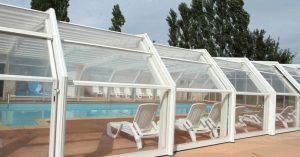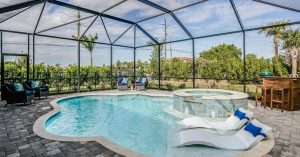Are Pool Enclosures Worth It? The Pros and Cons You Need to Know.
Are Pool Enclosures Worth It? Explore the pros and cons of pool enclosures and whether they’re worth the investment for your home.
Owning a swimming pool can be a great addition to your outdoor living space, providing a place to enjoy swimming and relaxation in the comfort of your backyard.
A pool enclosure can offer added protection and benefits to your swimming pool, including reduced maintenance costs and increased safety for children and pets.
You could get these services from us at McGowan Screen & Aluminum Specialists.
At McGowan Screen & Aluminum Specialists, we are in Bonita Springs, FL, with over 15 years of experience.
We can ensure that the enclosure Bonita springs serves you for the longest when it is about pool enclosures.
We use materials from trusted suppliers like Phifer, Town & Country, and ABC Supply to ensure long-term performance and durability.
Let’s look at the question, “Are pool enclosures worth it?” and look at what made it worth investing in.
What is Pool Enclosure?
A pool enclosure is an extension of your home, like a structure built around your pool.
It’s like a three-season room but with a pool in the middle! Better yet, your pool is now accessible year-round.

Benefits of a Pool Enclosure
These benefits are:
Enhanced Safety Features
Pool enclosures can help reduce cleaning costs and maintenance costs by keeping your pool clean and free of dirt and bugs.
Year-Round Enjoyment
With a pool enclosure, you can enjoy swimming and sunbathing in your backyard without worrying about the sun, bugs, or other distractions.
Durability and Material Options
For budget-conscious individuals, cheap pool enclosures can still provide durability and functionality.
Reduced Maintenance Efforts
A pool enclosure offers more pros than cons, including increased safety, easier maintenance, and added protection from the elements.
Enhanced Privacy and Energy Efficiency
A screened pool enclosure provides a safe and secure environment for swimming, protecting against insects, animals, and debris.
Types of Pool Enclosures
A pool enclosure can transform your outdoor pool space into a beautiful sight.
In this comprehensive article, we explore the various types of pool enclosures, and the pros and cons they provide to homeowners. They are:
Domed Enclosure
Pros. Cons.
Stylish options. Costs more on average.
Strong in extreme weather. Complex installation.
Highly customizable. Requires ample space.
Best for: All types of pools in areas with high winds.
Gabled Enclosure
Pros. Cons.
Two-story options. Costs more on average.
Freestanding or attached. Not as strong in high winds.
Debris slides off the roof. Complex installation.
Best for: Freestanding enclosures over pools far from your house.
Mansard Enclosure
Pros. Cons.
Middle-ground options. Costs more on average.
Matches home style. Flat section on top.
Strong in high winds. Not best for small pools.
Best for: large pools in high-wind regions.
Flat Enclosure
Pros. Cons.
Lower cost on average. Not as stable.
DIY options. Debris can gather on a roof.
Easy to connect to the home. Requires more space around trees.
Best for: budget-friendly enclosure options.
Lean-To Enclosure
Pros. Cons.
Retractable options. Costs more on average.
Extends living space. Not ideal for DIY.
Highly customizable. Must be attached to the home siding.
Best for: Small pools close to your home.
Retractable Enclosure
Pros. Cons.
Flexible design. High costs.
Highly customizable. Requires additional hardware.
DIY options. Not available in all shapes.
Best for: Pools in areas with a range of weather patterns.
Inflatable Enclosure
Pros. Cons.
Temporary solution. Not ideal for high winds.
Budget-friendly. Lower height options.
Easy to remove. Rarely customizable.
Best for: temporary pool coverage.
Pros of Pool Screen Enclosures
- Extends Swimming Season
A pool enclosure allows you to be comfortable and keeps the pool warmer. With the enclosure, you can take a refreshing dip year-round.
- Prevents Debris from Entering
Pool enclosures do not allow dirt to enter the pool and keep it always clean because it is covered. You’ll spend less time fishing out debris with a skimmer.
And since the water stays visibly clearer, you may even reduce your chlorine usage.
- Provides Privacy
The semi-transparent screen keeps neighbors from peering directly into your pool area.
- Allows Better Climate Control
The enclosed environment lets you take charge of conditions like temperature and humidity for ideal swimming. For a refreshing blast, point misters toward the pool.
- Protects from UV rays
It protects you and your children from sunlight that can burn or damage your skin while enjoying the pool.
- Saves on Chemical Costs
An enclosed pool requires less chlorine and other sanitizing chemicals compared to an open pool.
- Allows Pest Control
Mosquitoes and other flying insects cannot enter the protective screening; it is a pest-free zone. Some screens are even fine enough to keep fire ants and other tiny pests out.
- Adds Value to Your Home
Installing a pool enclosure boosts the value of your home. It transforms the pool into a 3-season amenity buyers covet rather than just a summer luxury.
Cons of Pool Screen Enclosures
- High Upfront Cost
Like I said before, installation of a full pool enclosure costs a lot, and it can be between $15,000-$30,000 depending on size.
- Can Feel Confined
Visually, the semi-transparent screens limit the view. And while bugs stay out, the airflow is also restricted. The enclosure seals the pool off from refreshing breezes.
For homeowners who value open space and unrestrained environments, an enclosure could seem claustrophobic.
- Ongoing Maintenance Required
Enclosures are durable, but the screens eventually need replacement every 5-10 years from wear and tear.
Storms may occasionally damage screens, too, and trees shedding leaves and seeds. And screens need occasional pressure washing to look clean, adding to regular maintenance.
- May Need Reinforcement
Enclosures are made to withstand wind, but not strong winds like storms or heavy snow. Consider adding reinforcement in storm-prone areas.
- It can attract insects/condensation like midges and fungus gnats that can slip through standard screens.
However, for many people, the benefits of a pool enclosure far outweigh the drawbacks, making it a worthwhile investment for their swimming pool.
Pool Maintenance and Upkeep.
A pool enclosure can make maintenance and upkeep easier, reducing the need for frequent cleaning and chemical treatments.
With a pool enclosure, you can keep your pool clean and free of debris, reducing the risk of pump damage and other maintenance issues.
Regular maintenance is still necessary, but a pool enclosure can help minimize the time and effort required to keep your pool in good condition.
By investing in a pool enclosure, you can enjoy a cleaner, safer, and more enjoyable swimming experience.

How long does a pool enclosure last?
The durability of a pool enclosure depends on what material it’s made of. The lifespans of different types of pool enclosures vary widely.
They last from 5 years to 25 years. The materials used in pool enclosures are:
- Aluminum.
- Polycarbonate.
- Glass.
- Mesh or screen material.
- Wood.
- PVC/plastic.
- Hybrid material.
- Fiberglass.
- Steel, acrylic.
- Fabric or vinyl.
It also depends on the maintenance. Proper maintenance will keep a pool enclosure healthy and sturdy for up to 25 years.
Conclusion
At McGowan Screen & Aluminum Specialists, we ensure your needs are taken care of and give you the satisfaction you desire.
Whether it is pool cage refurbishing, re-screening and repairs, new enclosure builds, picture window conversions, PCA entry doors & railings, concrete and stonework, we offer it all.
Looking for elegant lanai screen enclosures in Bonita Springs, FL, or a nearby neighborhood?
Come to us today, and we will be ready to meet your needs.













